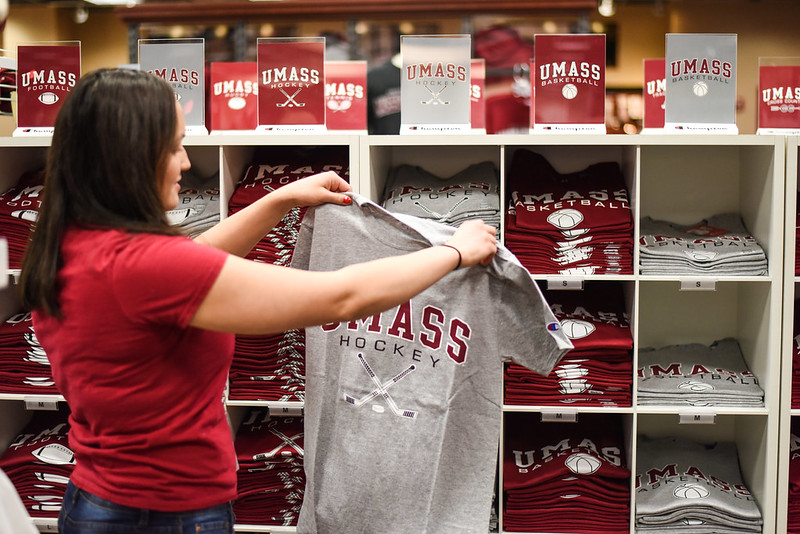In efforts to create a more sustainable environment and college campus, the University of Massachusetts campus store is striving to grow their sustainability section. The store is now developing an environmentally conscious rating system to be more transparent with customers.
The UMass Store sells sustainable apparel as well as what they call “hard goods,” like mugs and water bottles. When the UMass Store first opened, there were zero sustainably made products.
Courtney Weiand, director of sales, marketing and customer relations at the UMass Store, said that they now sell out their sustainable products as soon as the shipments start coming in.
“As far as our sustainable section goes, we did suffer a little bit over COVID-19, because we had some supply issues all around, so it’s still something we’re trying to build back up,” Said Weiand. “But, ultimately, our goal is to get back to where we were pre-COVID.”
Compared to before the COVID-19 pandemic, Weiand is hoping that the sustainability section will double in size, with more apparel options and hard items. The store sources from sustainable vendors for their sustainability section but is still trying to bring in additional vendors that fall under the sustainable merchandise category. They also ask all vendors not to ship their apparel in poly bags, a plastic that is impossible to recycle or reuse.
The UMass Store’s goal is to develop a rating system for each item in the sustainability section by the spring. The products will receive a rating based on things like labor standards, transportation, emissions, waste handling, upcycling, recycling, if the company donates, and other social and environmental aspects.
With increased transparency, the UMass store hopes that customers can know that they are not being “greenwashed,” a marketing tool used to convince consumers that their products are sustainable.
Sustainability has proved to be an important issue for students at UMass. “[Sustainability] has encompassed my life at this point,” said Rachel King, Student Government Association secretary of sustainability and senior environmental science major.
“I think sustainability is super important. Whether it be waste management or renewable energy, or just daily tasks that you can do yourself like shutting the light off before you leave for class. I think it can mean a lot of different things,” King said.
Greta Russo, sophomore environmental science and art double major, voiced concerns about the question of sustainability at the UMass Store. In terms of what they can do better, Russo suggested, “Only pairing with vendors that are very sustainable.”
King was positive about the line of sustainable products. “I think it’s just the beginning. And eventually we’ll see how this goes and make the whole store become more sustainable,” King said.
The more customers support the sustainable section of the UMass store, the more it can grow in quantity and range, said Weiand. She urges students to buy these products in hopes that the section will increase in size and be more successful.
“Realistically, it’s not feasible to turn our entire store into sustainable products. Especially because of inflation, prices going up everywhere, things are already very expensive. So, you know the most we can do is just get more from what’s available to us,” Weiand said.
Weiand is hoping that the UMass Store will become a “trailblazer” for other school stores.
Sydney Gulliver can be reached @[email protected].


















